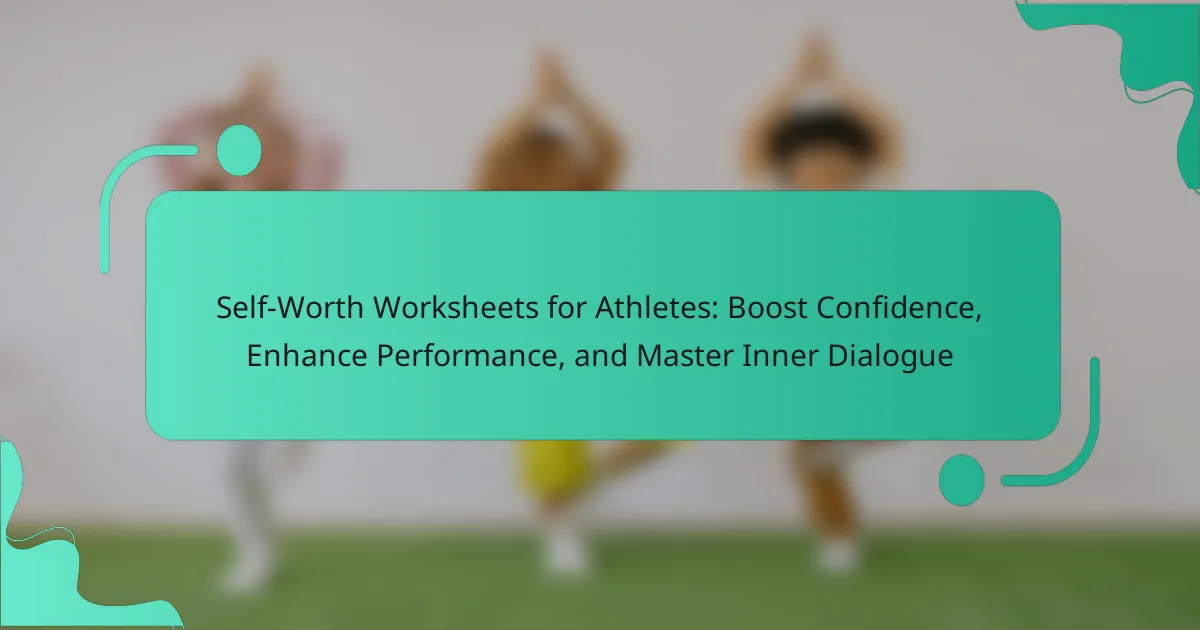Self-worth worksheets can significantly boost athletes’ confidence and enhance their performance. These tools promote self-reflection, set realistic goals, and foster a growth mindset. Regular use helps athletes master their inner dialogue, combat negative thoughts, and improve mental resilience. Understanding cultural influences on self-worth can further tailor these worksheets to meet diverse athlete needs.

How Can Self-Worth Worksheets Enhance Confidence for Athletes?
Self-worth worksheets can significantly enhance athletes’ confidence by promoting self-reflection and positive self-talk. These tools help athletes identify strengths and set realistic goals, which fosters a growth mindset. Regular use of these worksheets enables athletes to master their inner dialogue, reducing negative thoughts that can hinder performance. Research indicates that improved self-worth correlates with better athletic outcomes, making these worksheets a valuable resource for athletes aiming to optimize their mental game.
What are the key components of effective self-worth worksheets?
Effective self-worth worksheets for athletes include self-reflection prompts, goal-setting sections, affirmations, and performance tracking. These components foster confidence, enhance focus, and improve self-dialogue. Incorporating measurable outcomes allows athletes to assess progress and adjust strategies. Engaging with these worksheets regularly cultivates a positive self-image and resilience.
How do self-worth worksheets specifically benefit pro athletes?
Self-worth worksheets specifically benefit pro athletes by enhancing their self-confidence, which directly improves performance. These worksheets help athletes master their inner dialogue, enabling them to overcome self-doubt and maintain focus during competition. Improved self-worth correlates with increased resilience and better stress management, leading to superior athletic outcomes. Additionally, these tools facilitate self-reflection, helping athletes identify strengths and areas for growth, ultimately fostering a positive mindset essential for success in sports.
What role does self-reflection play in the worksheets?
Self-reflection is crucial in self-worth worksheets for athletes as it fosters awareness and personal growth. It helps athletes identify strengths, weaknesses, and patterns in their inner dialogue. This process enhances confidence and performance by promoting a positive self-image and setting achievable goals. Regular self-reflection leads to improved mental resilience and a deeper understanding of one’s motivations and aspirations. Ultimately, it empowers athletes to master their mindset and unlock their full potential.
How can athletes measure their self-worth progress?
Athletes can measure their self-worth progress through self-assessment worksheets that track confidence levels, performance metrics, and inner dialogue. These worksheets typically include sections for goal setting, reflection on achievements, and identifying negative thought patterns. Regular use helps athletes visualize growth and reinforce positive self-perception. Engaging with these tools enhances self-awareness, leading to improved performance and resilience in competition.

What Unique Attributes Do Self-Worth Worksheets Offer for Performance Enhancement?
Self-worth worksheets uniquely enhance athletic performance by fostering self-awareness, boosting confidence, and improving mental resilience. These worksheets encourage athletes to reflect on their strengths and achievements, leading to a positive self-image. This self-assurance translates into improved focus and motivation during training and competition. Moreover, the structured approach of these worksheets helps athletes master their inner dialogue, allowing them to combat negative thoughts effectively. As a result, athletes experience increased performance consistency and a greater ability to handle pressure.
How do tailored affirmations improve an athlete’s mindset?
Tailored affirmations significantly enhance an athlete’s mindset by fostering self-belief and focus. These personalized statements cater to individual strengths and challenges, promoting a positive internal dialogue. As a result, athletes experience increased confidence, which directly correlates with improved performance and resilience under pressure. Studies indicate that athletes using tailored affirmations report heightened motivation and reduced anxiety, demonstrating their unique effectiveness in mental conditioning.
What specific exercises can boost self-talk in athletes?
Engaging in specific exercises can significantly enhance self-talk in athletes. Techniques such as visualization, positive affirmations, and mindfulness meditation are effective methods.
Visualization involves mentally rehearsing successful performances, creating a positive mental image. Positive affirmations entail repeating encouraging statements to build confidence. Mindfulness meditation helps athletes remain present, reducing negative self-talk.
Incorporating these exercises regularly fosters a supportive inner dialogue, ultimately boosting self-worth and performance.
How can visualization techniques be integrated into worksheets?
Visualization techniques can be integrated into self-worth worksheets for athletes by incorporating imagery and mental rehearsal exercises. These methods enhance confidence and improve performance by allowing athletes to visualize success and positive outcomes. For example, worksheets can include prompts for athletes to draw or describe their ideal performance scenarios. This approach promotes mastery of inner dialogue and reinforces self-belief. Additionally, using visual cues can help athletes identify and challenge negative thoughts, fostering a positive mindset essential for peak performance.
What are the benefits of goal-setting within self-worth worksheets?
Goal-setting within self-worth worksheets enhances athletes’ confidence and performance by providing clear objectives. It fosters a sense of accomplishment, boosts motivation, and improves focus. Additionally, it encourages self-reflection and personal growth, allowing athletes to master their inner dialogue. These benefits contribute to a stronger mental framework, essential for achieving athletic success.

What Rare Attributes Make Self-Worth Worksheets Stand Out?
Self-worth worksheets for athletes stand out due to their unique attributes that specifically target performance enhancement. These worksheets incorporate personalized goal-setting techniques, which allow athletes to align their self-worth with their achievements. They also feature interactive exercises that promote self-reflection and resilience, helping athletes develop a growth mindset. Additionally, the integration of visualization practices in these worksheets is rare, as it enables athletes to mentally rehearse success, thereby boosting confidence.
Can personalized feedback from coaches enhance worksheet effectiveness?
Personalized feedback from coaches can significantly enhance the effectiveness of self-worth worksheets for athletes. This tailored guidance helps athletes identify strengths and areas for improvement, fostering a deeper understanding of their self-worth. Research indicates that personalized feedback increases engagement and motivation, leading to improved performance outcomes. Athletes who receive specific, actionable insights are more likely to internalize positive messages and master their inner dialogue, ultimately boosting their confidence.
What uncommon strategies can athletes utilize to deepen their inner dialogue?
Athletes can deepen their inner dialogue by utilizing uncommon strategies such as reflective journaling, visualization techniques, and mindfulness practices. Reflective journaling allows athletes to explore their thoughts and feelings, enhancing self-awareness. Visualization techniques help in mentally rehearsing performance scenarios, boosting confidence. Mindfulness practices cultivate present-moment awareness, reducing anxiety and fostering a positive mindset. These approaches can significantly improve self-worth and performance.
How can peer support be incorporated into self-worth practices?
Peer support enhances self-worth practices by fostering a sense of belonging and shared experiences. Engaging with teammates or fellow athletes creates an environment where individuals can openly discuss challenges and successes. This interaction builds confidence and reinforces positive self-dialogue, crucial for performance enhancement. Structured peer feedback sessions can help identify strengths and areas for improvement, promoting a growth mindset. Additionally, sharing personal stories of overcoming obstacles can inspire others, making the practice of self-worth more relatable and impactful.
What advanced techniques can athletes apply for sustained confidence?
Athletes can apply advanced techniques like self-worth worksheets to enhance confidence and master inner dialogue. These worksheets help identify strengths and set performance goals. Regular reflection on achievements fosters a positive self-image. Visualization techniques can also reinforce confidence by mentally rehearsing success. Integrating mindfulness practices aids in maintaining focus and reducing anxiety.

How Do Cultural Factors Influence the Use of Self-Worth Worksheets Among Athletes?
Cultural factors significantly influence the use of self-worth worksheets among athletes by shaping their perceptions of success and self-esteem. Different cultures prioritize various attributes, such as individual achievement or collective success, impacting how athletes engage with these tools. For instance, athletes from collectivist cultures may focus more on team dynamics and social validation, while those from individualistic cultures may emphasize personal goals. Moreover, cultural attitudes towards mental health can affect openness to using self-worth worksheets, with some cultures viewing them as beneficial and others as unnecessary. Understanding these cultural nuances can enhance the effectiveness of self-worth worksheets, tailoring them to meet diverse athlete needs.
What regional differences exist in the perception of self-worth in sports?
Regional differences in the perception of self-worth in sports significantly impact athletes’ confidence and performance. In collectivist cultures, self-worth often derives from team success, while individualistic cultures emphasize personal achievement. For example, in East Asian countries, athletes may feel pressure to perform for their community, enhancing their sense of belonging. Conversely, in Western nations, self-worth is frequently linked to personal accolades and individual milestones. These cultural nuances shape how athletes utilize self-worth worksheets, impacting their inner dialogue and motivation. Understanding these regional differences can enhance the effectiveness of confidence-building strategies tailored for diverse athlete populations.
How can athletes adapt worksheets to fit their cultural context?
Athletes can adapt worksheets to fit their cultural context by incorporating culturally relevant examples and language. This personalization enhances engagement and ensures the worksheets resonate with their unique experiences. Additionally, integrating community values and beliefs can foster a deeper connection, promoting self-worth and performance.

What Best Practices Should Athletes Follow When Using Self-Worth Worksheets?
Athletes should follow structured practices when using self-worth worksheets to effectively boost confidence and enhance performance. Start by setting clear, specific goals for each worksheet session. Regularly reflect on achievements, both big and small, to reinforce positive self-dialogue. Incorporate visualization techniques to imagine success, which can strengthen mental resilience. Lastly, maintain consistency by scheduling dedicated time for worksheet activities, ensuring they become an integral part of training routines.
What common mistakes should athletes avoid when implementing these worksheets?
Athletes should avoid common mistakes such as neglecting personal reflection, setting unrealistic goals, and failing to track progress. These errors can hinder the effectiveness of self-worth worksheets. Consistent self-assessment is crucial for building confidence and enhancing performance. Additionally, overlooking the importance of a supportive environment can diminish motivation. Engaging with coaches or peers for feedback can provide valuable insights and foster growth.
How can athletes optimize their inner dialogue for peak performance?
Athletes can optimize their inner dialogue by using self-worth worksheets to boost confidence and enhance performance. These worksheets help identify negative thoughts and replace them with positive affirmations. Regular practice fosters self-awareness and cultivates a growth mindset. By tracking progress, athletes can measure improvements in their inner dialogue, leading to peak performance.
What expert insights can enhance the effectiveness of self-worth worksheets?
Expert insights can significantly enhance the effectiveness of self-worth worksheets for athletes. Incorporating psychological principles, such as growth mindset and positive reinforcement, can foster a deeper understanding of self-worth. Engaging athletes in reflective practices, like journaling their achievements, cultivates self-awareness and confidence. Utilizing specific metrics, such as performance improvements linked to self-worth, can provide tangible evidence of progress. Furthermore, integrating group discussions allows for shared experiences, reinforcing community support and motivation.
